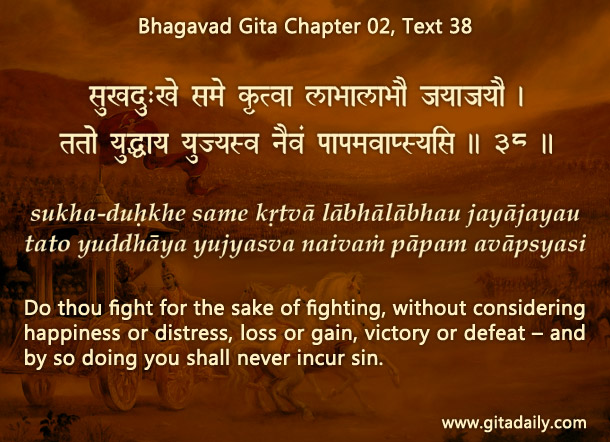Krishna’s stark self-contradiction – In the Bhagavad-gita second chapter, we encounter one of its starkest self-contradictions in two successive verses. First, it urges Arjuna to fight by considering the benefits of both possible consequences: winning and losing — by winning, he will attain a prosperous kingdom in this world and by losing, he will attain the heavenly planets in the next world (02.37). In the very next verse (02.38), it urges Arjuna to fight, casting aside all considerations of winning or losing.
Sensing Arjuna’s surprise at such self-contradiction, Krishna clarifies in the very next verse (02.39) that he is analyzing from a different perspective, thus addressing another of Arjuna’s reasons for not fighting.
In the Gita’s first chapter, Arjuna lists several reasons for not fighting. One reason centers on the losses in both winning or losing: in winning, he would have to face the loss of his relatives on the opposite side, whereas in losing , he would have to face the loss of his relatives on his side. Krishna addressed that concern by stressing the eternality of the soul, which implied that whoever lost their life fighting heroically in a battlefield would not actually die, but would ascend to heaven as a reward for their martyrdom. Hence, the verse about win-loss calculation (02.37).
Another of Arjuna’s reasons for not fighting centers on his fear of incurring sinful reactions by killing his relatives whom he was duty-bound to protect. In addressing that concern, Krishna explains the primary cause of karmic bondage: not actions themselves, but motivations for those actions. If Arjuna acted without any selfish motivation, solely as a duty, then he would stay free from any karmic reaction. Hence, the verse about casting aside win-loss calculation (02.38).
One-sentence summary:
The Gita’s stark self-contradiction in successive verses stresses the consistency of its call for action, even when that call is arrived at from varying forms of reasoning.
Think it over:
- How does the Gita contradict itself in its second chapter?
- Why does the Gita use win-loss calculation?
- Why does the Gita recommend casting aside win-loss calculation?
***
02.38: Do thou fight for the sake of fighting, without considering happiness or distress, loss or gain, victory or defeat – and by so doing you shall never incur sin.
To know more about this verse, please click on the image


Leave A Comment